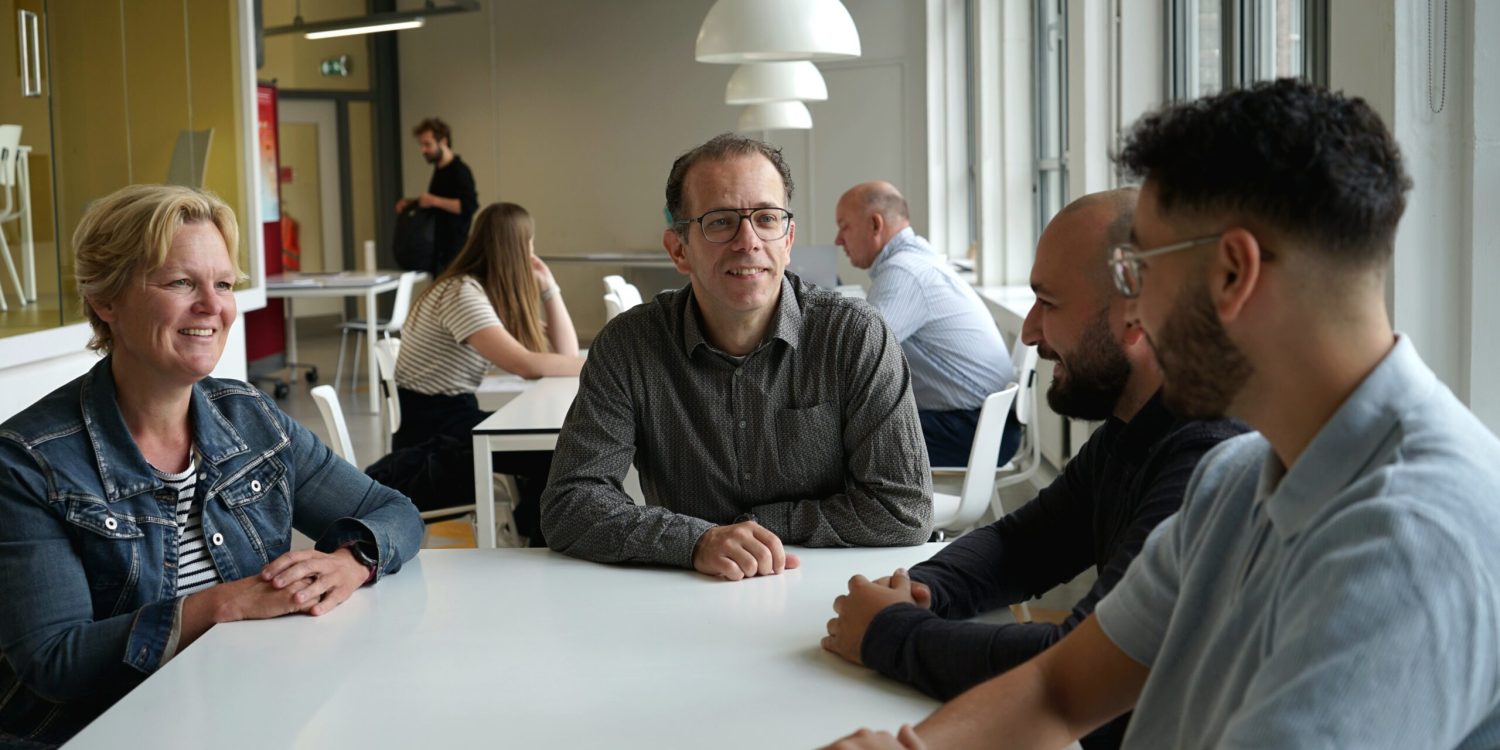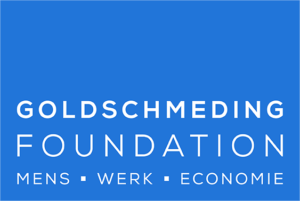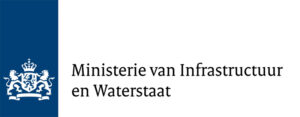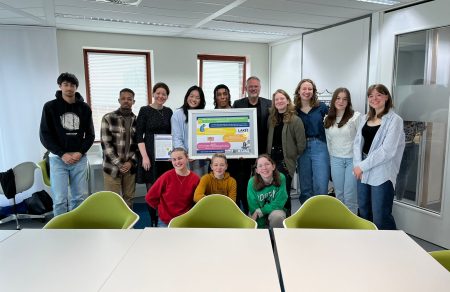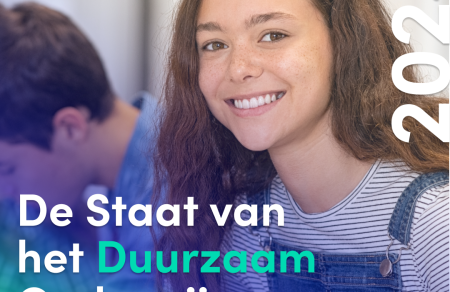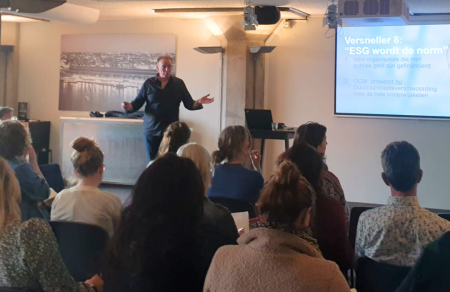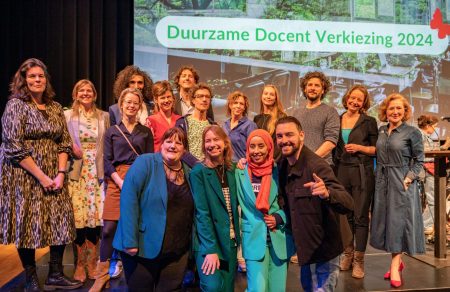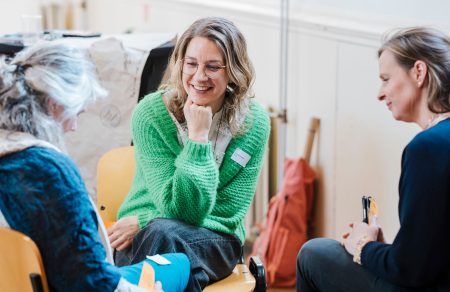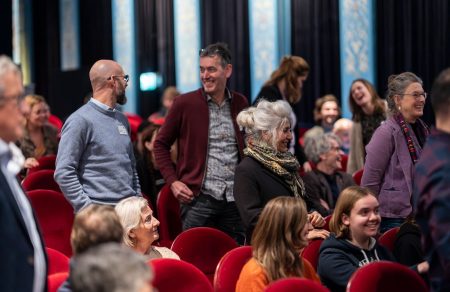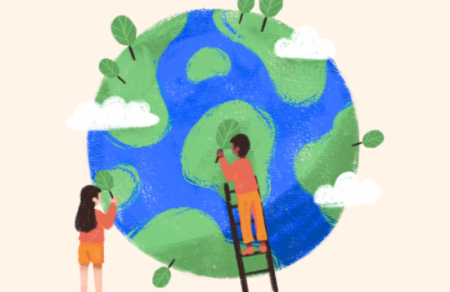This article is part of the Regioportret Rotterdam (article 3/3). With it we visualize how education and business in the Rotterdam region work together on 'circular skills': the skills needed in the circular economy of the future. We hope to inspire other regions to accelerate the transition to the circular economy.
TIP (Talent Innovation Pool) is a learning community of third-year students from Rotterdam University of Applied Sciences and young professionals from the business community. Together they work on innovation issues in the field of circular and zero-emission building. The goal of TIP is to connect education and business through task-oriented projects to accelerate the transition in construction. What is it like as a student to work on task-oriented projects? What is the role of education in the entire construction transition? And why is it so important for education to become interdisciplinary? We spoke with Gerthe Vonk, education manager for Architecture, and Haico van Nunen, lecturer in Sustainable Renovation at Rotterdam University of Applied Sciences. Both are closely involved in TIP and are concerned with construction education of the future. Zakaria Darnoun and Samed Soykök, third and fourth year Logistics Management students respectively participated in TIP and tell how they see future education.
What makes task-based education interesting for students
Samed and Zakaria both completed a TIP internship and worked on a joint project. Samed from the Province of South Holland and Zakaria from construction company Constructif. The concrete task: to transport the waste stream during the renovation of a building of Leiden University via water in order to spare the city and reduce the impact on the environment.
Samed: "What made this project so cool was that we were dealing with many parties from the very beginning and that it was for real. It was not a fictional assignment that you could do in the lee. I was really actively involved and had a clear role. During this internship, I learned to be resilient. Halfway through the internship, I had to completely change my plan because of a mistake in the process. That would never happen on a fictional assignment and then you don't get that lesson. Now I have changed course and for next time I know better what questions to ask prior to starting such a project. Making mistakes is ok. You adjust where necessary and learn from what went wrong. That is a great lesson.
Zakaria was particularly struck by how differently municipalities, businesses and other agencies communicate with each other. Also how there is cooperation or sometimes the lack of cooperation. "I saw so many opportunities for cooperation between construction and logistics. For example, when it comes to ordering concrete. To avoid over-ordering, coordination between the two disciplines is essential. That way you avoid extra logistics operations and possible waste'.
What is the role of education in the construction and renovation transition?
Gerthe: "Our students are going to improve the world and it is our responsibility to equip them with the right skills. It is up to us to prepare students for the labor market of the future. And that market, especially construction, is becoming increasingly fluid.' Whereas in the past a well-defined profession was sufficient, disciplines are increasingly merging into one another. With this, interdisciplinary collaboration is becoming the new standard. Haico: 'Students of architecture learn little about logistics and vice versa students of logistics learn very little about construction. While these two disciplines desperately need each other to create a path to a sustainable construction site. As a lecturer, Haico is concerned with the knowledge of the future. At the moment there is still very much a sense of presence. 'I have a problem now and it has to be solved immediately.' But we will really have to build and renovate differently in the future. Making practices and processes transparent and using checklists to ensure that all important choices are made consciously and sustainably. Zakaria: 'The course in logistics is very broad. The general magic word is optimization of processes and money is the main driver.' The same practically applies to architecture; as much profit as possible at as little cost as possible. And that's exactly where the turnaround is to be made. According to Haico, the sustainable choice is by no means always the most efficient or quickest choice. Yet you have to make it for the sake of the future.
Why do we focus on learning alone when in practice you never do it alone?
Zakaria asks this question during the interview, hitting the nail on the head exactly when it comes to interdisciplinary collaboration. He says, "You will need each other desperately in the future. An architecture student and a logistics student can complement each other well from the very first year. Actually, this applies not only to degree programs, but to the entire work field. The challenges of today and tomorrow require everyone to work together more transparently and interdisciplinarily.'
Haico adds that the lectorate's role is to ensure that training programs not only think about the long term, but also that training programs start to work much more together.' 'According to Gerthe, that also means that in addition to content, a whole set of skills will become increasingly important; cooperation, being transparent and communicating.
How will the role of teacher soon be?
Gerthe: "Teachers who now teach subject matter (architecture, performance, etc.) will have to look more at their neighbors. For them it is not natural to go beyond their own discipline and look at coherence and the bigger picture. And when you do start doing that, not only does the content and modules change, but it changes your role as a teacher from content expert to coaching and co-learning yourself. Of course, you always have your own expertise, but you can also step into that helicopter and look at the overall picture. Interdisciplinary collaboration should be present from the very first lecture. Samed adds, "If you want to train students for the future, the theory/practice ratio has to shift. You learn so much more in practice. Now mainly theoretical lectures are given. Today's freshmen still get exactly the same as I did three years ago. In my view, you should directly combine theory and practice.'
Zakaria advocates putting students first and foremost in their own strengths. 'Precisely by working together more, someone who is very strong theoretically can get along well with a practical fellow student. Now the focus is often on high grades, but what if I don't want to get those? That I just want to get on with things and a nine doesn't interest me at all? Gerthe explains that teachers tend to reward or applaud students who score high. 'But not every student goes for an eight or higher. And that should be OK. This also applies to teachers. Some excel in subject knowledge and others are born connectors'.
What is needed to move even more toward task-based education
Gerthe: "Much more cooperation between education and companies. Together determine what is needed to solve the challenges of the future and involve students as early as possible. Scaling up initiatives like TIP is essential in this. Last semester, 24 students/young professionals were introduced to task-based education. However, we have 4,500 students, so if we want to standardize this way of teaching in regular education, we have a lot of work to do. In addition, we need to move away from the educational level and move toward interdisciplinary education. In conclusion, she states, "Yes, but they are from logistics and we are from architecture is out of date.
Author: Clarisse Kers-van der Veld
Want to learn more about educating for an inclusive, sustainable future?
Sustainability Skills

As program manager for Architecture at Rotterdam University of Applied Sciences, Gerthe is committed to preparing students as well as possible for the job market of the future. In doing so, she emphasizes the potential of students to be able to improve the world and the responsibility of education to equip them with the right skills.

Haico van Nunen, lecturer in Sustainable Renovation at the Hogeschool Rotterdam, is concerned with the knowledge of the future. In it he notes that at the moment there is still a strong sense of presentiment and we like to solve acute problems. He argues that we need to make conscious sustainable choices now in order to build and renovate successfully in the future.

This enthusiastic Logistics Management student participated in the TIP. In it he noted how much you will need each other in the future to successfully tackle sustainable tasks. The challenges of today and tomorrow require more transparency and cooperation between different disciplines.
Samed Soykök
Samed also studies Logistics Management at the Hogeschool Rotterdam and was a participant of the TIP. In this article he shares his experiences from this project; Because how do you actually work together with many parties? What is it like to tackle a real challenge? And what did he learn from this task-oriented education?
